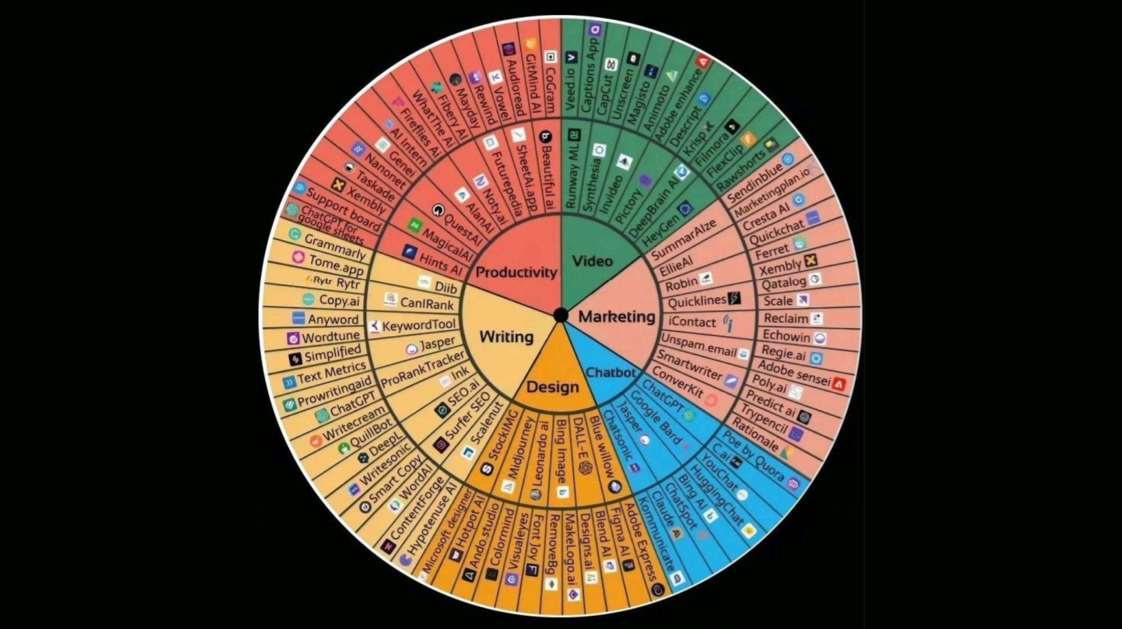AI In Your Business
WHERE TO GET STARTED WITH AI IN YOUR BUSINESS
One of the most common questions we get is: “How should we use AI for our business and in which areas does it make the most sense to use it?” We view AI as a tool to enhance human productivity, creativity and output. Not as a replacement for humans or human intelligence but as a powerful collaborator.
Embracing the power of AI in your business is a growth hack, transforming the way you operate and propelling your growth to new heights. With its ability to automate repetitive tasks, analyze vast datasets, and optimize crucial aspects like customer acquisition and sales, AI is undeniably a catalyst for increased efficiency and success.
If you’re already exploring the potential of AI and leveraging tools like ChatGPT and Midjourney, you’ve taken the first step towards a more AI-driven future. But now, the question isn’t whether to adopt AI, but rather how to seamlessly integrate it into your specific business workflows to impact your bottom line, create efficiencies, and supercharge your growth.
To scale AI across your organization, you’ll need to traverse different levels of implementation to determine how to use AI in your business systems and SOPs:
Level 1
At this stage, you may be leveraging existing “off the shelf” AI tools, such as ChatGPT, Opus, and others, to familiarize your team with AI concepts and capabilities. It’s about quickly adding value to your business by tapping into the power of readily available AI resources. But as your business requirements grow, you may need to teach AI to understand the nuances of your company, industry, and data. This involves prompt engineering and identifying the right information sources to feed essential information to AI about your company, customer data, and industry knowledge. Level 1 also entails strategizing how AI and human teams will collaborate, allocating specific parts of workflows to AI or human expertise.
Level 2
The second level takes things a step further by integrating custom AI tools into automation. Whether you’re working at the code-level or using no-code solutions, the goal is to embed AI tools within your automated workflows to boost efficiency and productivity. But to truly optimize this integration, it’s crucial to fully comprehend the capabilities of these AI tools and align them seamlessly with your business processes. The goal is not to replace humans within your organization, but to reallocate tasks and make your business stronger by partnering the right AI with the right people.
Level 3
involves Fortune 500 AI-powered models, many of which partner with companies like Microsoft to create custom-built enterprise solutions.
Deciding how deep you want to take your integration with AI is a key piece of the jigsaw, but another piece is deciding in which areas of your business you want to leverage AI to take full advantage of it.
There are three main business functions to use AI for business:
- Marketing and Sales
- Operations
- Finance and HR
Below you’ll find an analysis of the main ways that AI can help you in each of these business functions with some useful examples. Use these as inspiration to look deeper at the potential to incorporate AI in ways that can deliver growth.
The main focus is on Marketing and Sales, because at BizHack, this is the area we specialize in, however we have included a brief look at the other functions of operations and Finance/HR as AI has a role to play here as well.
For more information on individual tools that we recommend, from video editing to sales automations, click to read our rundown of AI Tools for Marketing and Sales.
MARKETING AND SALES
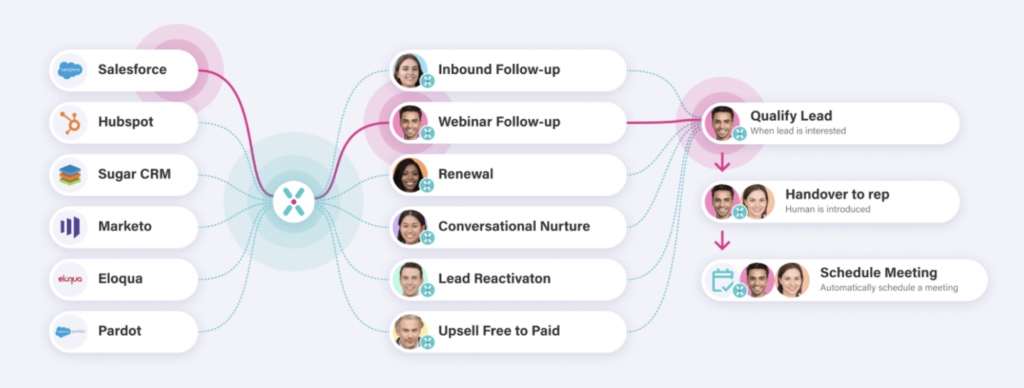
Balancing the many aspects of marketing is a pain point for most businesses. AI can help to align your marketing strategy and budget to maximize efficiency and produce ROI for your marketing efforts. By leveraging AI for product recommendations, content creation, and sentiment analysis, businesses can optimize marketing efforts.
AI for Lead generation
AI can analyze historical customer data to identify trends, helping businessses predict which prospects are likely to become clients. This approach saves businesses money, by focusing marketing efforts and allocating resources strategically to bring down customer acquisition costs. AI can also help you nurture leads and turn them into clients. Exceed.ai contacts your leads and engages with them in human-like conversations. Once the lead has been qualified, the tool hands off the lead to a human team member to schedule a meeting, making sure none of your leads fall through the cracks.
AI for Product Recommendations
AI can detect patterns and customer preferences, allowing businesses to deliver personalized marketing messages, product recommendations, and offers that resonate with their target customers to increase conversion rates in the process.
AI for Lead Scoring
AI can help evaluate and rank potential customers based on their likelihood to convert by processing large volumes of data like website visits, social media interactions, and email responses. AI can also create predictive models based on past data like demographics and engagement level. AI can also segment users based on characteristics and behaviors, allowing you to create personalized marketing strategies for each segment.
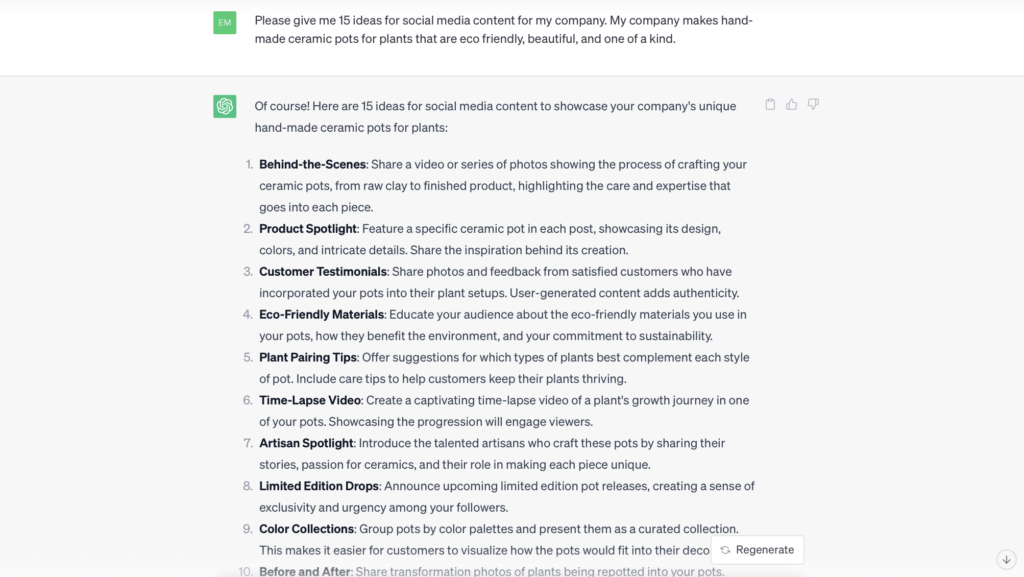
AI for Content Creation
Using AI for content creation is a natural fit, due to the capabilities of writing blog posts, social media content, email campaigns, and product descriptions. AI can be a valuable resource for marketing teams to increase content output and productivity. There are specific AI tools available to help create images, videos, illustrations, graphics, product photos, and ad creative. ChatGPT can quickly help you brainstorm ideas for social media content. In the above image, we asked it to generate ideas for social media posts for a company that makes ceramic pots for plants.

AI for Podcasting
AI can streamline multiple aspects of podcasting from show development, show notes, production, editing, and distribution. AI can be used to generate scripts and transcripts, automate editing and voice output, and even create podcast content through voice cloning. Tools like Descript make podcast and video editing extremely simple by allowing you to delete words from a transcript and automatically removing them from the audio and video. You can also use the tool to enhance audio quality without needing to invest in equipment like external microphones.

AI for Branding
AI can enhance branding efforts from research to brand visuals. Use AI to analyze competitor branding to identify gaps in the market and align your branding with market demands. AI can also create a visual identity for your business through logos, graphics, and copywriting and consistent brand messaging. The above example for the brand Birdland started with the AI generation of a logo, followed by the creation of a brand kit made up of logo, fonts and colors and finally renditions of how it would look across brand collateral. View the process here which was done by Looka.com
AI for Brand Research
AI can significantly enhance brand research by automating data collection, analysis, and interpretation, thereby providing businesses with deeper insights into consumer behavior, sentiment, and market trends.

AI for Email / Email Marketing
AI can revolutionize email communication and marketing by making it more personalized, efficient, and effective. Especially when integrated with your email platform and CRM, AI can be used to create an email strategy, personalize emails by customer segment, and optimize all aspects of email marketing like A/B testing, send times, compliance monitoring, conversion prediction and metrics analysis. You can also use AI to generate emails for drip campaigns, sales campaigns, and automated responses. Tools like AI Email Writer save you hours of back and forth email writing. The tool is powered by ChatGPT and integrates into Google Mail. It reads the context of previous emails to predict what to say next and generate a reply.

AI for Social Media
There are a range of AI tools focused on social media management from strategy development, content creation, calendar management, and data analysis. Use AI to create social media visuals like graphics, video clips, and images. Tools are also available for automatic posting and analyzing user engagement. AI excels at pattern recognition and it can detect social media trends and monitor keywords related to your business. The above image is from Opusclip. A tool that can take a longer video and break it into clips for use on social media, complete with captions. The image shows how AI has highlighted specific keywords which AI detects as trending. By highlighting high value keywords within the captions on the video Opusclip using eye-catching colors it increase the video watch time by 65%.
AI for Social Media Monitoring
AI can monitor social media platforms for specific keywords, hashtags, or mentions related to your brand, industry, or competitors. AI can also monitor social media for mentions and conversations related to your brand, allowing you to respond quickly to any potential PR crises or customer service issues.
AI for Sales Emails
AI can play a crucial role in developing your client outreach strategy and maximizing the impact of sales emails. AI can analyze customer data to automatically customize email content with relevant information, such as the recipient’s name, company, and recent interactions. Use AI to nurture leads by automating follow-up emails based on customer behavior, to move them through the sales funnel with timely and relevant content, even triggering messages for prospects who haven’t replied.

AI for Paid Ads
AI can also be used to create paid ads, including video and images, cutting down on costs and increasing results from paid advertising. AI tools can also save time by generating multiple copy and ad creative versions to test on out for your market. The above ad creative was made using Pencil, a tool that will help you brainstorm creative ideas, make the content using images and text, generate copy and make multiple variations to test. The tool also predicts which ad creative and copy will give you the best results to make your ad spend more effective.
For a list of AI tools we recommend, read our AI Tools for Marketing and Sales blog post.
AI for Marketing Content
In addition to social media content, AI can be used for creating and improving all types of marketing content. Your team can use AI to generate ideas for blogs, write content, and create preset templates for blog posts and other marketing materials to ensure consistency. You can use AI for both long-form and short-form content and even summarize longer blog posts to create additional blogs. Aside from blogs, use AI to create ebooks Lead Magnets, and press releases, custom landing page content, and copy for marketing campaigns
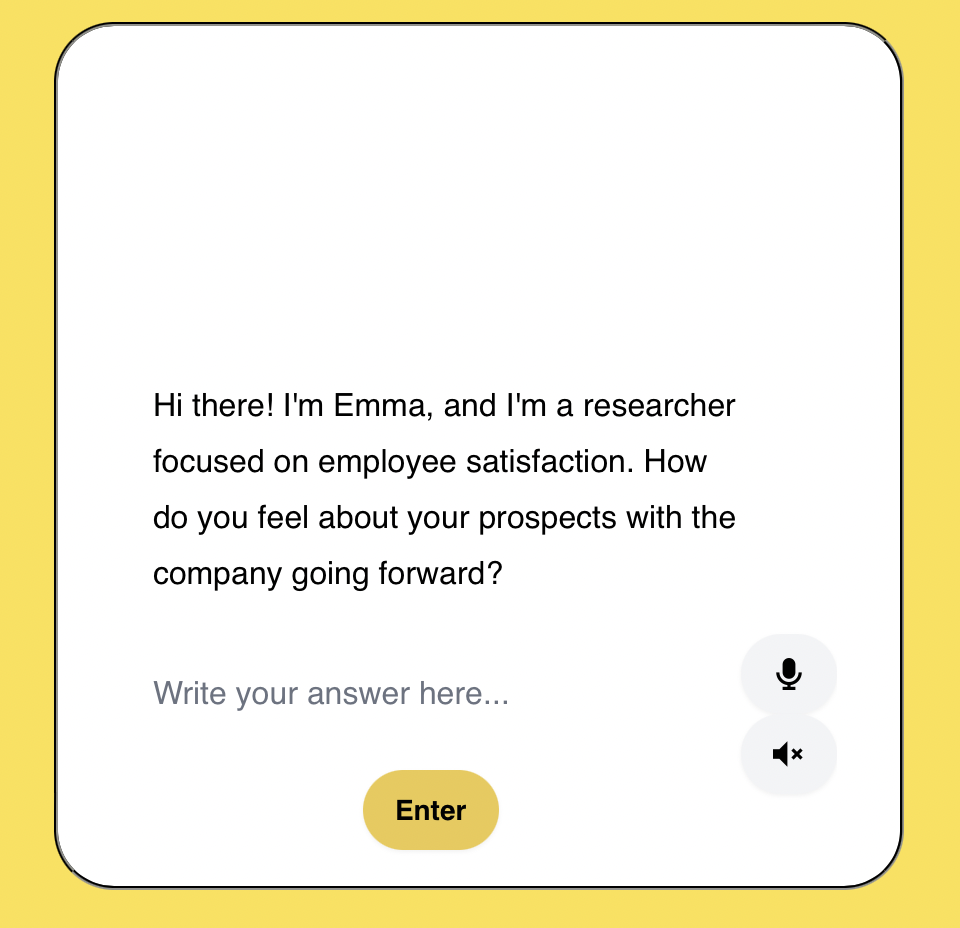
AI for Sentiment Analysis
AI can assess the emotional tone and attitude expressed in text. By analyzing user comments and mentions it can gauge sentiment, allowing you to address both positive and negative feedback promptly. Sentiment analysis powered by AI helps organizations gain a deeper understanding of customer opinions, monitor brand perception, identify emerging trends, and make data-driven decisions. It’s widely used in social media monitoring, customer service, market research, and brand management. Surveys are also a great way to identify sentiment. In the image above, ChattySurvey is engaging with a user to determine what they value. The tool also does follow ups to help you create action plans based on findings.
AI for Influencer Marketing
AI can help identify potential influencers whose audience aligns with your brand, streamlining the influencer marketing process. AI can also predict the potential success of influencer collaborations based on the past performance of the influencer and the level of engagement of their audience with their posts. Use AI to draft Influencer agreements, create content calendars, and analyze performance data.
AI for Market Research
Your business can benefit from using AI to conduct market research, gain consumer insights, monitor competitors, identify opportunities, and detect trends. By extracting knowledge from websites, forums, news articles and social media AI can help you determine the best target demographic and their behaviour and use it to forecast trends.
AI for Marketing Strategy
Generate a yearly marketing strategy by using AI to help you define your business goals, create customer avatars for your target market, and identify what makes your business unique. You can use AI to recommend the marketing channels that will reach your target audience most effectively. AI can assist in campaign planning, by suggesting content themes, ways to segment your target and optimum timing of communication. Use AI to create marketing content, such as blog posts, social media posts, and videos. AI should complement and enhance your marketing team’s capabilities, helping them better allocate resources and maximize ROI.
To develop a comprehensive marketing plan driven by the partnership between AI and seasoned marketers, check out our Fractional Chief Marketing Officer services and learn how you can grow faster with us here.
AI for Affiliate Marketing
Enhance affiliate marketing with AI by using it to select affiliate partners and track their performance. AI can analyze partner profiles, content, and audience demographics to identify affiliates that align with your brand and target audience. AI can generate dynamic affiliate links that route users to the most relevant product or landing page based on their preferences and behavior. Use AI to improve data accuracy by using it to detect any fraudulent activity or bot-generated traffic that might skew results. AI can also analyze commission structures and suggest optimal rates to incentivize affiliates while maintaining profitability.
AI for PR Strategy
Get more publicity for your business by using AI to generate media contact lists and identify potential opportunities. Use AI to generate a list of influencers and thought leaders, create customized pitches, and flag any dream media opportunities. Your business can use AI to write Press Releases and monitor brand sentiment to get ahead of any potential issues.
AI for CRMs
AI can be a game-changer when integrated into Customer Relationship Management (CRM) systems. It can enhance customer interactions, automate processes, provide valuable insights, and optimize overall customer management. Many CRMs are integrating AI for better customer management. These systems make use of AI’s ability to conduct predictive analysis, and segmentation, automate responses, and guide reps on sales calls in order to optimize the customer experience. CRMs with AI integrations often use bots to aid in developing communication that can run 24/7 and is more personalized.
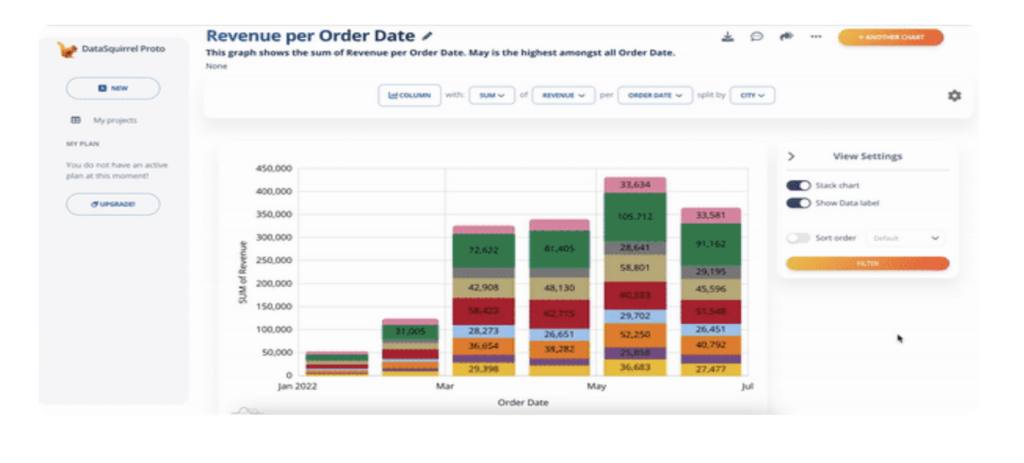
AI for Sales
AI plays a pivotal role in sales by analyszing your historical sales data to uncover successful patterns, which in turn refines sales strategies and bolsters conversion rates. Additionally, AI forecasts customer behavior and trends, inclduing purchasing patterns, churn probabilities, and opportunities for upselling. This proactive insight empowers businesses to cater to customer needs effectively while enhancing decision-making. Furthermore, AI seamlessly generates real-time dashboards and comprehensive reports that provide a lucid snapshot of customer interactions, sales pipelines, and team performance. Tools like DataSquirrel, shown above can help teams visualize their sales and optimize for spikes in sales cycles. Then marketing and sales can work together to create sales promotions for the low periods of the cycle to increase revenue.
AI for Competitor Research
AI can analyze data from competitors’ online presence, social media engagement, and customer feedback to provide insights into their strengths and weaknesses. AI can help identify opportunities in the market to inform decisions on how your brand can differentiate itself from competitors based on consumer perceptions and preferences.

AI for Creativity
AI and humans can collaborate to be improve creativity. Use AI to brainstorm and drive innovation within your business. AI can generate a wide range of ideas and concepts, helping teams explore diverse possibilities for products, services, and campaigns. Use AI to provide design suggestions, generate visual aids, and even assist in creating mockups and prototypes for products and marketing materials. AI algorithms can help creative solutions to complex business problems and also generate stories, music, and art. In the image above, we asked ChatGPT to brainstorm what new product lines we could introduce for a company that sells staffing services.
AI for Pricing Optimization
AI can analyze cost structures and profit margins to recommend pricing that meets your revenue goals. AI monitors competitors’ pricing strategies and recommends adjustments to stay competitive while maintaining profitability. It also calculates price elasticity by analyzing how changes in price affect demand, helping determine optimal price points. AI can help you price subscriptions and repeat transactions to incentivize long-term relationships. AI can also suggest the best times and levels for discounts and markdowns to clear excess inventory while minimizing profit loss and plan for promotions.
AI for Chatbots
AI and chatbots go hand in hand. Due to the natural language processing of AI, chatbots can provide more intelligent, personalized, and efficient interactions with users. They can maintain context across conversations and recognize user intent to route them to the right department. AI improves the user experience of chatbots by allowing automated responses to easily be created in multiple languages. The cost efficiencies of chatbots reduce the need for human agents to handle routine inquiries, saving time and operational costs. By integrating AI capabilities, chatbots improve user experiences and drive business growth.
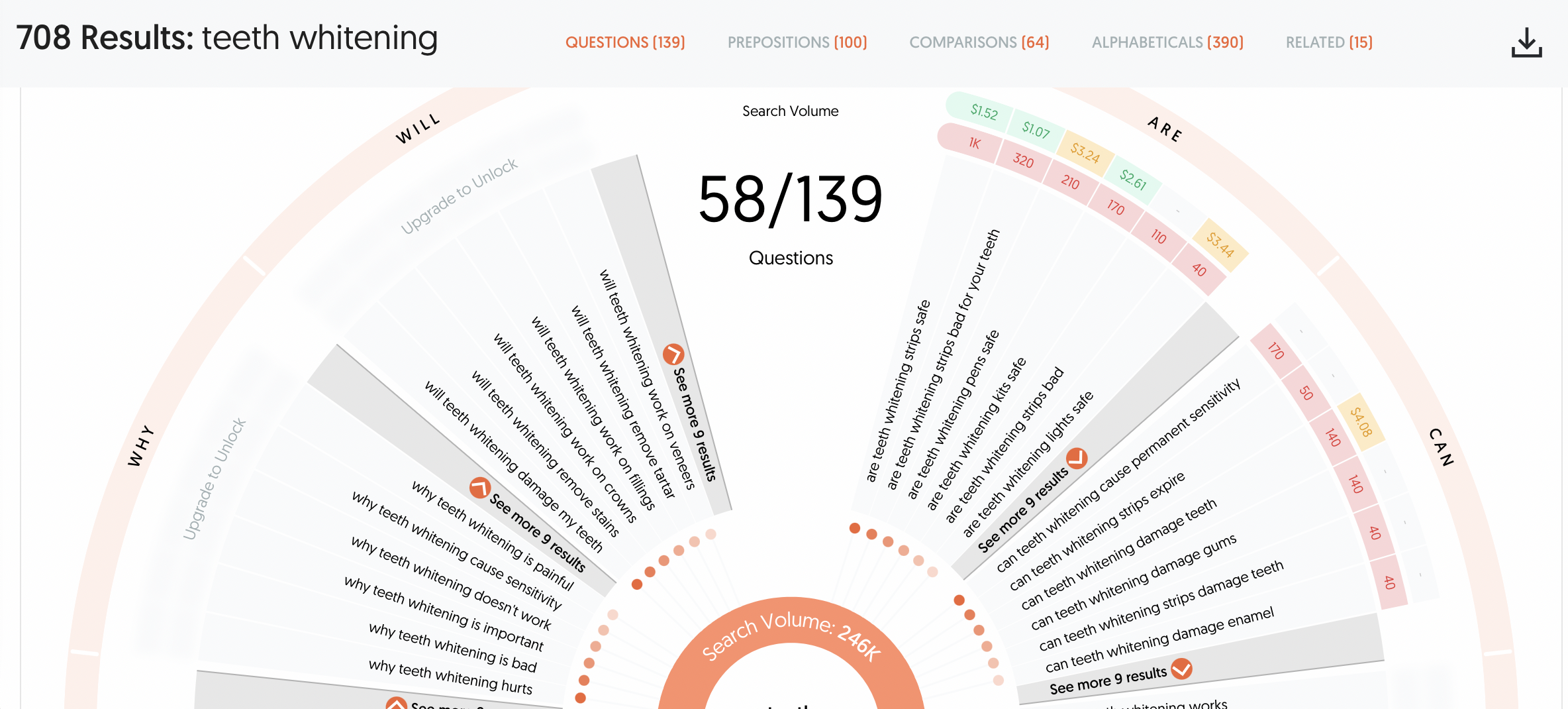
AI for SEO
Using AI for SEO enables businesses to quickly respond to changes in search terms, deliver relevant content to users, and improve their online visibility. AI can be used for keyword research, content optimization, and performance analysis. Leverage AI to identify relevant websites for link-building opportunities based on content themes and industry relevance. AI can also help in generating compelling headlines, suggesting keywords, and ensuring SEO optimization. Use Answer the Public to gauge what types of questions users are searching related to your product or service. Base your SEO content on the searches and use them to create content for social. Above, we searched the term “teeth whitening” to reveal what people are curious about.
To learn more about how to master AI for marketing and sales, enroll for our AI for Marketing and Sales Course.
OPERATIONS
AI can streamline business operations by automating repetitive tasks, improving efficiency, and enhancing decision-making. It aids in predictive maintenance by analyzing data to prevent equipment failures, optimizes supply chain management through demand forecasting, and assists in real-time monitoring of processes for proactive issue resolution. AI transforms operations by increasing productivity, reducing costs, and fostering agile and data-driven business strategies.
AI for Customer Service
AI-powered chatbots can assist customers with inquiries and provide instant support. For example, a retail company could use AI chatbots to help customers track their orders, suggest products based on preferences, and resolve common issues without human intervention.
AI for IT & Security
AI can enhance cybersecurity by detecting and mitigating threats in real-time. An organization might deploy AI-driven anomaly detection to identify unusual patterns in network traffic, helping prevent data breaches. Additionally, AI can automate IT tasks like software updates and system maintenance, improving operational efficiency.
AI for Fraud detection
Businesses can use AI algorithms to analyze transaction data and identify suspicious activities indicative of fraud. For instance, if a corporate credit card is suddenly used for large transactions in a foreign country, AI can flag and alert the company or block the transaction to prevent potential fraud.
AI for Supply Chain Management
AI can optimize supply chain operations by predicting demand, managing inventory levels, and streamlining logistics. An example is a manufacturing company utilizing AI to forecast demand for their products, ensuring that production aligns with actual customer needs and minimizing overstock or shortages.
AI for Process Automation
AI-driven automation can streamline repetitive tasks across various departments. For example, a manufacturing company could implement AI-driven process automation to optimize their production line. Sensors and cameras placed along the assembly line could collect real-time data on product quality, machine performance, and production rates. AI could then analyze data to increase efficiency and reduce costs.
AI for Data Analysis
AI can process large datasets quickly, extracting valuable insights. A logistics company can collect data on factors like traffic patterns, weather conditions, delivery locations, and vehicle performance, to build a comprehensive dataset. AI algorithms can then analyze this data to identify patterns and correlations. The AI system can use this analysis to dynamically adjust delivery routes in real-time, optimizing for factors like fuel efficiency and delivery time.
AI for Client Management
AI-powered CRM systems can analyze customer interactions and history to improve relationship management. Teams could utilize AI to identify upsell or cross-sell opportunities based on customer purchase histories and preferences.
AI for Predictive Maintenance
Industrial sectors can benefit from AI predicting equipment failures. For instance, a utility company might employ AI to monitor the performance of power generators and forecast maintenance needs, reducing downtime and operational costs.
AI for Demand Forecasting
Businesses can use AI to predict consumer demand for specific products, optimizing inventory levels and reducing surplus. This technology helps companies allocate resources more effectively and minimize overstock or stockouts.
AI for Decision Support
AI-driven analytics can assist executives in making informed decisions. Businesses could use AI to evaluate various scenarios by simulating market changes, regulatory impacts, and financial projections, aiding strategic choices.
AI for Churn Prediction
Companies can predict customer churn by analyzing historical data and identifying factors that correlate with customers leaving. Digital-focused companies can leverage AI to predict which subscribers are more likely to switch providers and take proactive retention measures.
AI for Speech Recognition
Speech recognition powered by AI enables voice interfaces for various applications. Speech recognition tools use AI to understand and respond to spoken commands, enhancing user experience. In warehouses for example, employees can simply speak the item names or codes, and the AI-driven system will accurately interpret and process their requests. This hands-free approach increases worker productivity, reduces errors.
AI for Data Visualization
AI can transform complex datasets into visually understandable insights. Data visualization tools powered by AI help professionals in different domains understand trends, correlations, and outliers in data more easily and share this information across departments.
AI for Credit Scoring
A B2B company that extends credit terms to its clients can utilize AI-powered credit scoring to assess the creditworthiness of potential customers. Instead of relying solely on traditional credit scores, the company can integrate AI algorithms that analyze a variety of data sources. This could include the client’s payment history, financial statements, business news, and industry trends. The AI system processes this information to provide a more accurate and holistic credit risk assessment.
AI for Brainstorming
AI-powered brainstorming tools can generate creative ideas and suggestions. Teams can input their goals and constraints, and AI algorithms can provide innovative solutions or concepts to explore further.
AI for Business Strategy
AI can assist in formulating business strategies by analyzing market trends, customer behavior, industry data, competitors’ product launches, pricing strategies, and customer sentiment, providing valuable insights for staying ahead. It can recommend strategic directions based on competitive landscapes and emerging opportunities.
AI for Goal Setting
AI tools can help individuals and teams set realistic and achievable goals by analyzing historical performance data and considering external factors. For instance, a sales team can use AI to set sales targets that align with market conditions and historical trends.
AI for Quality Control
AI can enhance quality control processes by analyzing product or process data in real-time. In manufacturing, AI-powered visual inspection systems can identify defects in products on assembly lines, ensuring consistent quality and reducing defects.
AI for Summarizing
AI-driven summarization tools can automatically condense lengthy documents or articles. For example, organizations could use summarization tools to generate key takeaways in industry reports, financial documents, and research papers.
AI for Language Translation
AI language translation systems like Google Translate utilize neural networks to provide accurate translations between languages. These systems learn from vast amounts of translated texts to produce more fluent and contextually relevant translations. For businesses, the entire operating manual or company proprietary training materials can be easily translated using AI.
AI for Virtual Assistants
Virtual assistant tools use AI to understand and respond to user commands. They can perform tasks such as understanding the context of a meeting and taking notes, creating follow ups and setting reminders. Virtual Assistants can also sending messages, answering questions, pull up relevant files, and offering personalized assistance.
AI for Business Development
AI can aid business development efforts by analyzing market trends and identifying potential leads. Companies might use AI to analyze data from various sources to pinpoint potential business opportunities and partnerships.
FINANCE AND HR
AI enhances finance departments by automating financial analysis, risk assessment, and fraud detection, while also providing accurate predictions for investment decisions. In HR, AI streamlines recruitment with resume screening and candidate matching, improves employee engagement through sentiment analysis, and optimizes workforce planning by analyzing performance and skills data.
AI for Recruitment and Talent Acquisition
AI can analyze resumes, screen candidates, and identify potential matches for job roles based on keywords, skills, and past experiences. It can also conduct initial interviews via chatbots or video analysis to shortlist candidates, streamlining the recruitment process and saving time for HR teams.
AI for HR
HR teams benefit from AI in managing employee data, answering routine HR-related queries, and automating administrative tasks like leave requests and onboarding processes.
AI for Payroll
AI can automate payroll processes by accurately calculating salaries, taxes, and deductions based on complex regulations and individual employee circumstances. This reduces manual errors and ensures timely and accurate salary disbursement.
AI for Financial Management
Finance teams can use AI to analyze financial data, predict cash flows, and recommend budget allocation strategies. For instance, AI-powered tools can assess historical spending patterns and suggest optimized financial plans, aiding businesses in making informed financial decisions.
AI for Contract Analysis
Use AI to review and extract key information from legal contracts, helping businesses ensure compliance, identify risks, and manage obligations more efficiently. AI-powered contract analysis can significantly speed up the contract review process.
AI for Predictive Analytics
Predictive analytics can forecast future financial trends and HR patterns. This helps companies anticipate market shifts, plan for workforce changes, and make proactive decisions to optimize their operations and resources.
AI for Fraud Detection
In finance, AI algorithms can monitor transactions and detect unusual patterns indicative of fraud. Similarly, in HR, AI can identify anomalies in employee behavior or activities, helping prevent insider threats or policy violations.
AI for Employee Engagement
AI can analyze employee sentiment from surveys, feedback, and communication data to identify factors affecting engagement. It can provide insights for HR teams to take actions that boost employee morale and satisfaction.
AI for Anomaly Detection
Identify anomalies in financial transactions or employee behavior that might indicate fraudulent activities or unusual patterns with AI. This assists in detecting potential issues early and mitigating risks.
AI for Skill Development
In HR, AI can analyze employee skills and competencies, suggesting personalized learning paths for skill development. This promotes upskilling and reskilling, enhancing employee growth and contributing to a more skilled workforce.
